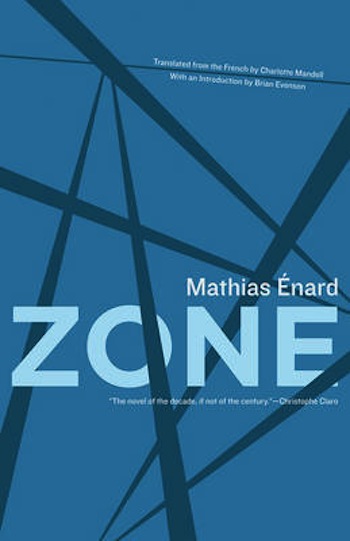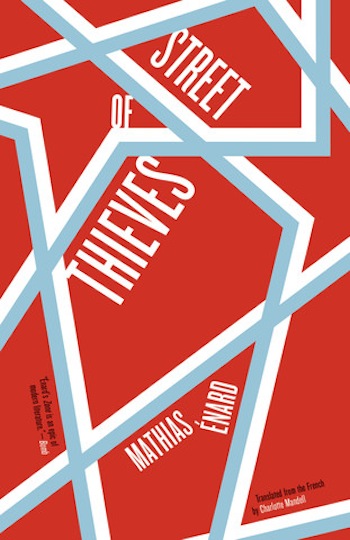Fuse Book Review: The Novels of Mathias Énard — Probing the Intersection of Politics and Conscience
Although Street of Thieves is less accomplished than Zone, it once again displays how Mathias Énard is seeking new ways to talk about political issues in precise, often gripping prose that reflects the complexity of individual psychology.
Zone, by Mathias Énard, translated by Charlotte Mandell, Open Letter, 519 pp., $16.95.
Street of Thieves, by Mathias Énard, translated by Charlotte Mandell, Open Letter, 265 pp., $15.95.
By John Taylor
Although he had already published a prizewinning first novel, La perfection du tir (2003), about a sniper in a civil war somewhere in the Middle East (probably Lebanon), and then written two other critically regarded novels, Mathias Énard (b. 1972) became especially well known in France with the publication of Zone (2008). Formally elaborate, psychologically penetrating, and profusely detailed, Zone was awarded no less than five important literary prizes.
Subsequently published in 2010 by Open Letter in Charlotte Mandell’s excellent translation, Zone consists of a single sentence that runs on for more than five hundred pages. Lest this feat scare you off, let me immediately add that this is an absorbing novel that recounts, via stream-of-consciousness, how the narrator, Francis Servain Mirković, a spy for the French Secret Service, intends to sell secret documents to the Vatican.
He is riding on an overnight train from Milan to Rome, his suitcase “discreetly handcuffed to the luggage rack.” The secret papers concern countries such as Spain, Italy, Yugoslavia, Lebanon, Egypt, and Algeria, places in which he has been involved in various “dealings.” The Mediterranean basin is the “Zone” of the title.
A French-born Croat who also fought on the Croatian side during the Yugoslav Wars (1991-1996), Mirković has decided to withdraw from all conflict, stop spying, and utterly change his life. Love is involved; even more so, perhaps, he has a deep desire to extinguish “the last glimmer of violence” in himself.
As the train progresses, his memories and ruminations move over the recent past, embracing crucial details from his personal life as well as those related to the political, religious, and ethnic turmoil of the Mediterranean countries. Yet Zone is no simplistic ‘politically committed’ novel, let alone a thriller—though elements of the latter genre are by no means lacking. Énard filters the tempestuous contemporary world through the intricate mental processes of a man who has contributed to that violence and now wishes to be absolved.
Four years later, and after two additional books, Rue des voleurs (2012) appeared in France. Now available as Street of Thieves in Mandell’s equally skillful translation, this new book is formally less ambitious than Zone. But its themes, embodied in the main character and narrator, a young Moroccan named Lakhdar, are not dissimilar. Nor is the narrative vantage point, with the exception of the single-sentence storytelling. The reader eventually learns that Lakhdar has been imprisoned and is pondering, through the very writing of Street of Thieves, his past deeds. Expiation is also at stake as well as in his effort “to rediscover who [he] was” during various phases of his life.
Initially set in Tangiers, where Lakhdar is the son of pious Muslims, this fictional memoir begins by evoking the irresistible love between the young man and his cousin, Meryem, who lives in the same house. When the couple is caught naked and making love, Lakhdar is beaten and thrown out the house by his father. He subsequently wanders, as a beggar, throughout Morocco. Eventually he decides to return to Tangiers, but not to his parents:
People see us without seeing us, sometimes they give us a few kicks so we’ll disappear, and few, very few, imagine on what railing, on what balcony we sleep at night. I wonder what I thought of, at the time. How I held on. Why I didn’t simply go back after two days to my father’s house and collapse on the living room sofa; why I didn’t go to the town hall or God know where to ask for help, maybe because there is in youth an infinite force, a power that makes everything slip by, that makes nothing really reach us. [. . .] But then, after ten months of being on the run, three hundred days of shame, I couldn’t bear it any more. I had paid my dues, maybe.
The “maybe” is significant. Lakhdar is already yearning for something that he cannot yet name. Books increasingly enter into it, both fueling his longing and deepening his perspective on his life and surroundings. He is essentially an autodidact. Even before being thrown out of his parents’ house, he improved his French by poring through French detective novels picked up in a used-book shop. And he was also already writing poetry. Arriving back in Tangiers after his wretched near-year as a bum, he discovers that his best friend, Bassam, has become involved with Islamic fundamentalism. Yet thanks to Bassam and his Islamist connections, Lakhdar ends up working as a bookseller for the Group for the Propagation of Koranic Thought. This job offers the penniless Lakhdar a way to make a living, though he figures out that the Group is not just propagating “thought.”
As in Zone, Énard explores the workings of self-consciousness and the conscience in regard to behavior that might well be at odds with what is expected of one—here, by pious Muslims, not to mention fundamentalists—but also with some of one’s self-expectations. Lakhdar and Bassam study the Koran, including the erudite commentaries, and attend the mosque on Fridays, but they also sneak off to drink beer in a distant café where they won’t be seen and ogle scantily dressed foreign tourist girls. Kif, too, gives relief. And both distraction and enlightenment are provided, for Lakhdar, by the lurid, sordid plots of French (and later Spanish) whodunits.
At one point, the young men pick up two Catalan girls, both students of Arabic. Lakhdar’s subsequent relationship with one of them, Judit, will become a significant part of the narrative. Through both male characters, Énard examines how strict religious practices can sometimes coexist with erotic desires and various worldly aspirations. Lakhdar, who has the more complex personality of the two friends, is at once drawn to Islamic philosophy and to something else that, at least theoretically, counters Islamic strictures. He peruses the Koran alongside murder stories, Casanova, and the marvelous tales told by the traveler Ibn Battuta. “Life [is] far away,” he admits late in the novel, as he continues to attempt to narrow the distance. One hears the echo of Rimbaud’s “genuine life is absent,” from A Season in Hell—a title that could also apply to Lakhdar’s life. From his prison cell, he writes:
I have made use of the world. Life consumes everything—books accompany us, like my two-penny thrillers, those proletarians of literature, travel companions, in revolt or resignation, in faith or abandonment.
But back to the presence of the past in Lakhdar’s mind. The political context is intense. The Arab Spring (2010-2012) is underway. Sheikh Nureddin, the leader of the Group for the Propagation of Koranic Thought, is keenly interested in how Islamists could come to power in Morocco and elsewhere amid the chaos. Although Lakhdar cannot be sure, he suspects that Sheikh Nureddin might be pulling the strings behind some of the aggressive Islamist activism in the area. And on one occasion, Lakhdar will himself participate in an act of violence.
Well-known current events thus not only provide a backdrop to the plot of Street of Thieves, but at times drive it. For example, one of the key events in the story is the explosion of the bomb, in Marrakesh, in the Café Argana (on 28 April 2011), an all-too-real terrorist act that was much discussed in France since eight of the seventeen people who were killed were French citizens. In Énard’s fictional reconstruction, Judit happens to be in Marrakesh on that very day, and she later tells Lakhdar offhand that she had spotted Bassam near the café. Lakhdar was unaware of his friend’s absence from Tangiers. Because of other disturbing facts associated with the Group for the Propagation of Koranic Thought, Lakhdar wonders if Bassam is somehow implicated in the bombing.
Does Énard rely too heavily on such spectacular current events, which, given the publication date of the original French novel, must have popped up on his television screen while he was drafting the book? On the one hand, Balzac and Zola had no qualms about inserting contemporaneous events into their otherwise fictional narratives. Today, we are likely to view what once made headlines as mere background settings, not burning issues. Yet for Street of Thieves, in which current affairs are omnipresent, this question must be raised, though less in regard to the Café Argana bombing. The author uses the bombing, and Bassam’s possible involvement in it, to deepen our understanding of Lakhdar’s personality. New doubts about his best friend affect his own intellectual and moral development; in a word, it propels his attempt to come to a greater awareness of himself and the world—which defines his overarching, unappeasable, quest.
But in the third section of the book, events related to equally well known protest movements in Spain, especially to a general strike in Barcelona (where Lakhdar has in the meantime settled as an illegal emigrant), take center stage. The result is lots of background material that is less intimately tied to the main character’s soul searching.
At this stage in the novel, Lakhdar has been working as an undeclared employee for Señor Cruz, whose firm embalms corpses of illegal immigrants who have died in Spain and ships them back to the Maghreb; and Cruz has just committed suicide by poisoning himself, a death that the police might construe as a murder. This has forced Lakhdar—who has taken advantage of the situation to steal Cruz’s money—to flee to cheap lodgings in a Barcelona street literally called the “Street of Thieves.”
It is Lakhdar’s reflections about his disgusting former job, his boss’s suicide, and his theft, as well as about his faltering relationship with Judit (who may be dying from a brain tumor), that is essential to the narrative’s tension and density, not so much the unrest in the city. Énard, who is a professor of Arabic at the University of Barcelona, shows off his knowledge of his adopted town a little too often in some of these late passages. Lakhdar fades temporarily into this background: external reality is no longer filtered through his introspections with the same intricacy that made the earlier passages memorable. Yet Bassam and Lakhdar come together in a final scene that once again exhibits Énard’s flare for forceful storytelling. Here, as with other significant dramatic confrontations in this novel, political and religious questions give way to a tragic perception that what matters most deeply can never be fully known.
Although Street of Thieves is less accomplished than Zone, it once again displays how Énard is seeking new (or, rather, reviving and transforming old) ways to bring the real world – especially ideological issues – into precise, often gripping prose that reflects the complexity of individual psychology.
Inner and outer worlds are similarly blended in his latest book, the graphic novel Tout sera oublié (Actes Sud, 2013), which means “Everything will be Forgotten.” Succinct prose texts accompany Pierre Marquès’s compelling paintings, which focus on Sarajevo both during and after the Yugoslav War. It is a haunting sequence that also alludes to a love story that seems to have been partly destroyed because of the Yugoslav tragedy. One thinks of Lakhdar and Judit, whose love is increasingly diminished, though not completely, by events beyond their control in Street of Thieves.
John Taylor is the author of the three-volume Paths to Contemporary French Literature (Transaction, 2004, 2007, 2011). Transaction Publishers has just issued his new collection of essays, A Little Tour through European Poetry. He has translated numerous French poets, most recently Louis Calaferte (The Violet Blood of the Amethyst, Chelsea Editions, 2013) and José-Flore Tappy (Sheds, Bitter Oleander Press, 2014). He lives in France.
Tagged: Charlotte Mandell, Contemporary French Literature, Mathias Énard, Open-Letter, Street of Thieves




